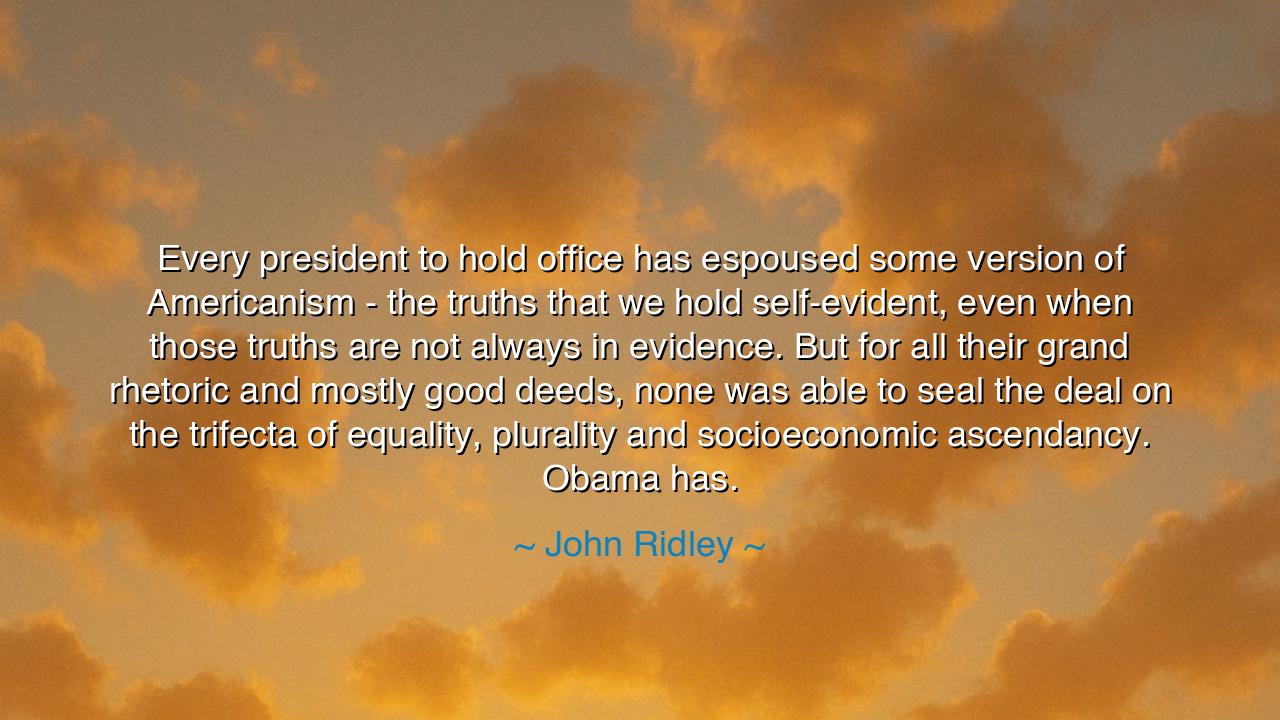
Every president to hold office has espoused some version of
Every president to hold office has espoused some version of Americanism - the truths that we hold self-evident, even when those truths are not always in evidence. But for all their grand rhetoric and mostly good deeds, none was able to seal the deal on the trifecta of equality, plurality and socioeconomic ascendancy. Obama has.






When John Ridley wrote, “Every president to hold office has espoused some version of Americanism — the truths that we hold self-evident, even when those truths are not always in evidence. But for all their grand rhetoric and mostly good deeds, none was able to seal the deal on the trifecta of equality, plurality, and socioeconomic ascendancy. Obama has,” he spoke not merely of politics, but of the eternal struggle for identity in the soul of a nation. His words ring like a modern scripture — an observation on how ideals, once proclaimed with fire, too often dim before they are fulfilled. Ridley’s reflection calls us to witness the moment when hope, long deferred, finally found flesh in leadership.
Since the birth of the republic, Americanism has been the creed of aspiration — the belief that liberty, justice, and opportunity belong to all. It was the torch carried from Washington to Lincoln, from Roosevelt to Kennedy, each proclaiming the same “self-evident truths.” Yet, as Ridley reminds us, those truths were often not in evidence. The same soil that birthed liberty also bore slavery; the same flag that promised equality waved over segregation and poverty. Every president spoke of freedom, but the fulfillment of that promise remained distant, veiled by the contradictions of power and prejudice.
When Barack Obama rose to the presidency, the world beheld something unprecedented — a man whose very existence embodied the plurality America professed but had rarely embraced. He was the son of a Kenyan and a Kansan, born of two worlds and shaped by many cultures. His ascent was not only political; it was symbolic. In him, the trifecta Ridley names — equality, plurality, and socioeconomic ascendancy — converged into reality. Equality, for the barriers of race that once seemed impenetrable had yielded. Plurality, for the many voices of America — Black, white, immigrant, and native-born — could see themselves reflected in power. And socioeconomic ascendancy, for he proved that the child of humble origins could rise to the highest office through intellect, resilience, and vision.
But this triumph was not his alone. It was the culmination of centuries of striving, of sacrifice, of faith. From Frederick Douglass who spoke of liberty while in chains, to Rosa Parks who defied injustice with silence, to Martin Luther King Jr., who dreamed of the mountaintop even as he walked through the valley of hatred — Obama stood upon their shoulders. Each had pressed forward when progress seemed impossible, believing that America could become what it claimed to be. Ridley’s words honor not only Obama’s achievement, but the countless hearts that burned for justice long before the dawn.
Yet Ridley, wise in his observation, reminds us that the work of freedom is never “sealed.” A single man may symbolize a nation’s awakening, but symbols do not suffice. Even as Obama rose, inequality persisted; prejudice whispered in the halls of progress; and the dream, though closer, was not complete. The truths of Americanism — liberty and justice for all — must be tended like a sacred flame, lest they flicker in the winds of complacency. Every generation must guard them, renew them, and live them anew.
To understand Ridley’s declaration is to recognize that leadership alone cannot redeem a people — only their collective conscience can. Obama’s ascent was proof that the ideal could be reached; the people’s response determines whether it will endure. The lesson is ancient and eternal: that every civilization must wrestle between its promise and its practice. It is not enough to proclaim virtue; one must embody it, not enough to speak of equality; one must create it.
Therefore, let the heirs of this age remember: the truths self-evident must also be truths made evident. Let no one believe the work is finished, nor the victory secure. Let artists, thinkers, and leaders continue the mission Ridley described — to make equality real, to honor plurality not as tolerance but as strength, and to ensure that economic power serves human dignity, not dominance. For when a nation aligns its ideals with its deeds, when its people rise above division to honor the full humanity of one another, then — and only then — can it be said, as Ridley said of that moment — that the promise of America has, at last, been fulfilled.






AAdministratorAdministrator
Welcome, honored guests. Please leave a comment, we will respond soon